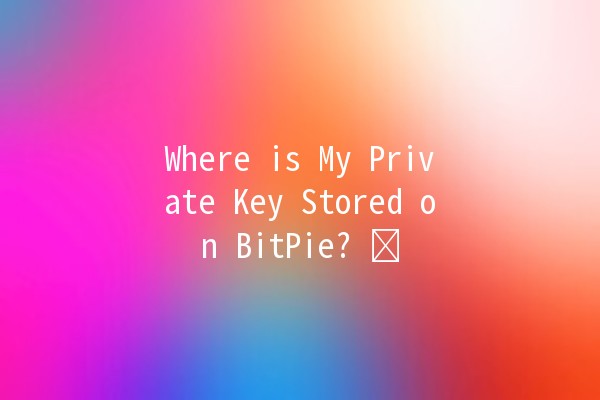
When discussing cryptocurrency wallets, one crucial aspect that often gets overlooked is the importance of private key storage. For those engaging with BitPie, a popular multicurrency wallet known for its security features, understanding the specifics of private key location is vital for safeguarding digital assets. In this article, we will explore where private keys are stored in BitPie, accompanied by practical tips to enhance security and ensure user productivity.
Understanding Private Key Storage ⚙️
Private keys are essentially passwords that give users access to their cryptocurrency wallets. They should be kept confidential at all costs, as anyone with access to the private key can control the associated cryptocurrency. BitPie employs several methods to manage and secure private keys.
How Does BitPie Manage Private Keys? 🔒

Benefits of BitPie’s Approach 🛡️
Isolation from Internet Vulnerabilities: By keeping private keys offline, BitPie significantly reduces the risk of hacking and phishing attacks compared to webbased wallets.
User Control: Since users hold their private keys, they have complete control over their cryptocurrencies, as opposed to centralized exchanges where users’ assets are managed by third parties.
Effective Tips for Enhancing Security in BitPie 🔑
Explanation: A strong password combined with twofactor authentication (2FA) adds an extra layer of security.
Implementation: Activate 2FA in your BitPie wallet settings and use a password manager to create complex and unique passwords for your wallet and associated email.
Explanation: Backing up your wallet ensures you have access to your private keys in case of device failure or loss.
Implementation: Export your wallet data and write down your seed phrase. Store it in a secure location, ideally offline, such as a safe or safety deposit box.
Explanation: The device you use to access BitPie should be secure from malware and unauthorized access.
Implementation: Use reputable antivirus software and keep your operating system updated. Avoid downloading untrusted applications that could compromise your device's integrity.
Explanation: Public WiFi networks are often insecure, making it easy for hackers to intercept data.
Implementation: Avoid using BitPie on public WiFi. If necessary, use a Virtual Private Network (VPN) to encrypt your connection.
Explanation: The cybersecurity landscape is constantly evolving. Staying informed allows you to better protect your assets.
Implementation: Follow BitPie’s official channels for security updates and join cryptocurrency forums to discuss vulnerabilities and best practices with other users.
Navigating BitPie’s Security Features 🌐
BitPie’s comprehensive security features provide users with tools to protect their cryptocurrencies effectively. Understanding these features is key to maximizing your experience with the wallet.
User Education on Phishing
BitPie encourages users to stay vigilant against phishing attempts, where fraudsters impersonate the wallet or other services to steal information. Always verify URLs and never disclose your private key or seed phrase to anyone.
Multisignature Support
For those managing substantial amounts of cryptocurrency, multisignature wallets can enhance security. This feature requires multiple private keys to authorize a transaction, reducing the risk of theft.
Hardware Wallet Compatibility
For longterm storage of cryptocurrencies, consider integrating a hardware wallet. While BitPie offers robust security, hardware wallets provide an additional layer, keeping your private keys offline and away from potential cyber threats.
Frequently Asked Questions (FAQs) ❓
Losing your private key can be critical. If you have the seed phrase, you can regenerate your private key. If you do not have the seed phrase, unfortunately, access to the funds may be irretrievable.
Regular backups are crucial. It's advisable to back up your wallet every time you make a significant change—such as adding a new coin or after receiving a large transfer.
Yes, BitPie is designed with advanced security measures. However, for very large holdings, consider using a hardware wallet for added security.
Yes, you can use BitPie across multiple devices, but ensure that private keys are kept secure. The wallet synchronization will allow you to manage the same wallet on different devices.
BitPie is a noncustodial wallet, meaning you retain control of your private keys. As long as you have your keys and seed phrase, your assets remain safe, irrespective of the company's status.
BitPie employs encryption, local private key storage, and security best practices to minimize the risk of unauthorized access. Regular software updates also help address security vulnerabilities.
If you suspect a breach, immediately transfer your assets to a new wallet with a new seed phrase and private key. Change passwords and enable 2FA on all connected accounts.
💬
Navigating the world of cryptocurrency requires a solid understanding of the mechanisms governing private key storage. With BitPie, users can enjoy a secure and userfriendly experience for managing their digital assets, provided they adhere to the recommended safety practices. Staying informed and implementing these strategies will help you maximize your cryptocurrency security and navigate the increasingly complex digital landscape with confidence.
By actively engaging with the tools and resources available, users can ensure their private keys remain protected and their cryptocurrency transactions secure, setting the stage for a successful experience within this innovative financial paradigm.

